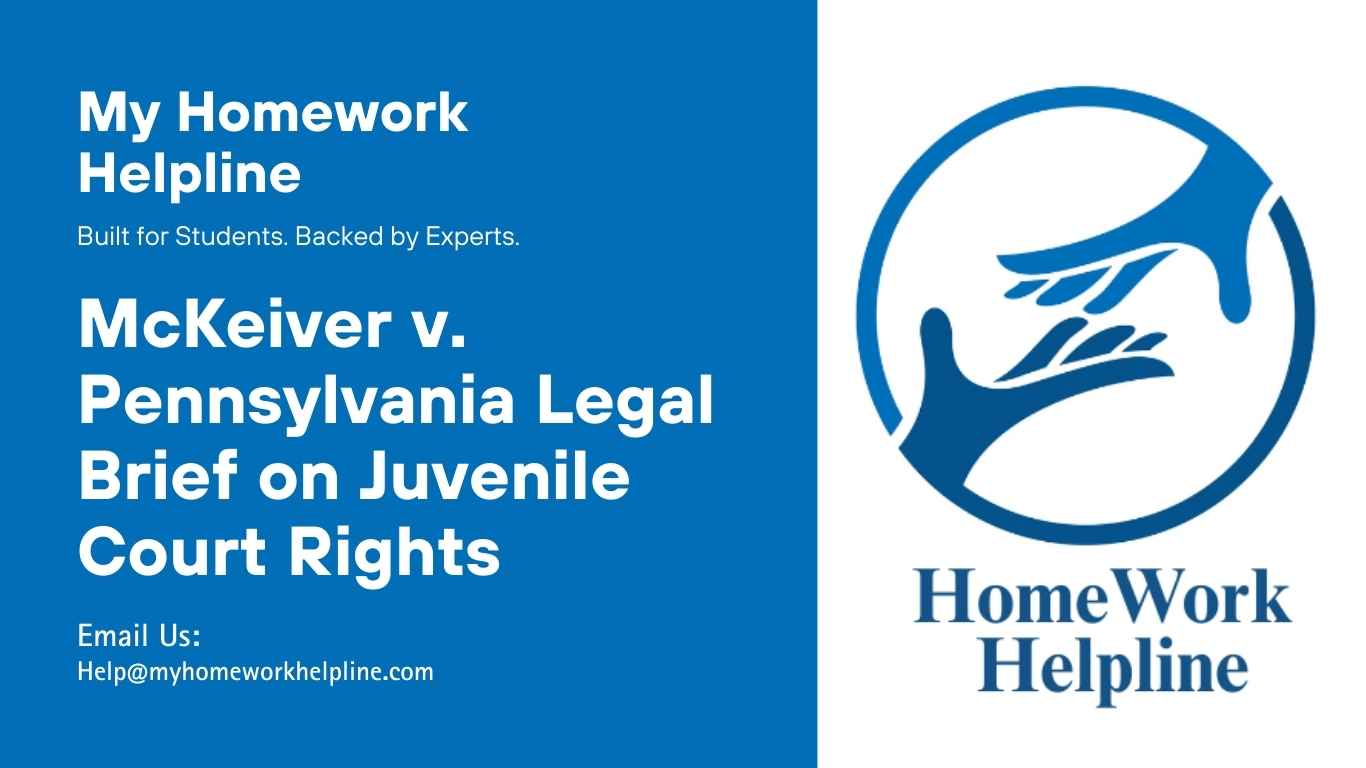McKeiver v. Pennsylvania Legal Brief: Juvenile Rights and Jury Trials
Statement of Facts:
The case is a combination of several cases from North Carolina and Pennsylvania. In the Pennsylvania cases, a 16-year-old was charged with assaulting an officer, and a 15-year-old was charged with larceny, robbery, and receiving stolen goods. In the North Carolina cases, students of varying ages from 11 to 15 were charged with several offenses including disorderly conduct in connection with protests relating to racial discrimination (Baharanyi & Hertz, 2018). All the cases took place in a juvenile court since the individuals charged were juveniles. The juveniles were denied a jury trial in juvenile court. In North Carolina, the cases took place in proceedings that were closed to the public. All the juveniles appealed the denial for requesting jury trials.
Details of Case Background:
In North Carolina, the State Court of Appeals affirmed appellants’ denial of jury trials, which was also affirmed by the Supreme Court of North Carolina.
In Pennsylvania, the State Supreme Court established that there was no constitutional right to a jury trial in juvenile court.
The US Supreme Court granted certiorari for the case from the two States (DeMatteo et al., 2022).
Issue and Holding
Does the Due Process Clause of the Fourteenth Amendment guarantee individuals a jury trial in juvenile court?
Answer
No
Judgment:
The decisions of the two Supreme Courts of North Carolina and Pennsylvania were affirmed.
Rule of Law or Legal Principle Applied:
A jury trial is not constitutionally needed in juvenile court.
Reasoning:
The court concluded that a jury was not guaranteed in juvenile court as the standard process for juvenile proceedings is fundamental fairness, the reason being, a jury is not guaranteed by the Due Process Clause of U.S. Const. amend. XIV. Fairness is based on fact-finding procedures, including the right to counsel, cross-examination, confrontation, notice, and stand of proof in juvenile proceedings (DeMatteo et al., 2022). They noted that a jury is not primary to fairness in fact-finding noting that juries were not required in workmen’s compensation, equity, deportation, or probate cases. Additionally, juvenile prosecution was also not considered criminal or civil. Therefore, the entirety of the Sixth Amendment could not particularly apply, and jury trials were not needed in juvenile proceedings. Hence, the reason most states did not require a jury in juvenile courts.
The court held that juvenile courts, based on numerous shortcomings, had not succeeded in focusing on rehabilitation and the parental attention juveniles should receive (DeMatteo et al., 2022). However, it was not the time to give up on juvenile courts and simply treat juveniles as if they are adults in criminal courts.
Preparing a legal brief can be challenging without expert guidance. At My Homework Helpline, we provide professional support for law essays, case briefs, and criminal justice assignments. Whether you’re analyzing constitutional issues or juvenile rights, our reliable law homework help ensures your work is accurate, well-structured, and fully supported by research. Get the academic edge you need with personalized homework assistance for your toughest law assignments.
My Opinion
I agree with the ruling by the Supreme Court of the United States. The reason I agree with the ruling is that States are not constitutionally mandated to have jury trials in juvenile courts. While I may disagree with upholding the ruling of the cases that took place in closed courts in North Carolina, still, the difference between criminal courts and juvenile courts is largely jury trials. The law views adults as having the ability to make conscious choices and therefore responsible for their actions. However, juveniles are viewed to act based on environmental forces hence they are not in control of their actions (Baharanyi & Hertz, 2018). Therefore, there must exist a fundamental difference between how the two are treated in the court proceeding. Additionally, States are at liberty to use juries if they choose to, however, since the Due Process Clause does not mandate it, most states do not use it because it does not guarantee fairness. I also believe that juvenile courts are fundamentally different in purpose and approach from criminal courts, hence they both cannot include jury trials.
References
Baharanyi, Z., & Hertz, R. (2018). The many stories of In re Gault. In Rights, Race, and Reform (pp. 2-19). Routledge.
DeMatteo, D., Thornewill, A., & Fishel, S. (2022). Overview of US Supreme Court and State Court Decisions Impacting Juvenile Justice. Routledge.

